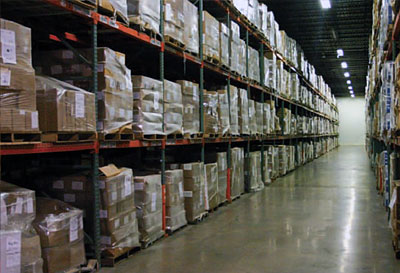By Eileen Dallabrida
Sir Speedy Newark (SSN) launched in 1995 in a 1,600-square-foot space in Newark, a franchisee of the nation’s oldest and largest printing and marketing services network.
SSN began differently than most other operations as it opened without a traditional offset press. With a vision of providing digital and on-demand print services to the tri-state area, SSN embraced the changes that technology was bringing to the industry.

Sir Speedy Newark employed techniques learned from a lean manufacturing workshop presented by DEMEP to optimize production space. Photo provided by Sir Speedy Newark
The business grew quickly as partners Alan Gardner and John Riley fostered a “yes-period” culture and developed an immediate reputation for providing quality customer service. SSN captured the State Chamber’s Superstars in Business Award in 2001. Today, SSN serves customers nationwide and overseas and has grown into a digital, print on-demand printing and fulfillment center occupying more than 30,000 square feet.
With rapid sales growth and expansion, SSN also faced operational challenges, including optimizing its space, streamlining workflow processes and maintaining production efficiency.
“The print industry and the markets it serves were continuing to change and we had to make better use of our resources,” Riley recalls.
Looking for ways to improve the business, he attended an informational workshop on lean manufacturing presented by the Delaware Manufacturing Extension Partnership. Accredited by the National Institute for Standards and Technology, DEMEP’s mission is to substantially improve the quality, productivity and profitability of manufacturers in the state by identifying, transferring and implementing best practices.
“We are wholly dedicated to teaching businesses ways in which they can be more efficient”, says Stephen quindlen, DEMEP director. “Developing strategies that help manufacturers and other businesses be more profitable is our passion.”
Riley returned from the workshop energized and eager to apply lean principles to his business.
“I was tremendously excited because it was immediately clear to me that lean techniques could do great things for our operation,” he says.
SSN obtained a grant from the Delaware Economic Development office to train its staff of more than 30 employees in 5-S principles.
“We needed to learn how to process more projects for our customers both faster and at less cost,” says Aileen Huester, vice president of operations. originally rolled out in Japan, 5-S focuses on effective organization and standardized procedures to simply workflow, reduce waste and eliminate non-value-add activities during production while increasing quality, effectiveness and safety. The 5-S principles translate to: Straightening, Systematic cleaning or Shining, Standardizing and Sustaining.
Lisa Weis, a DEMEP manufacturing specialist, evaluated and analyzed workflow throughout SSN’s operation from administration, creative design services and on-demand printing through fulfillment.
Starting with foot traffic, Weis meticulously mapped the steps needed to process and fulfill customers’ orders. Her maps, posted prominently throughout the building, highlighted steps that could be eliminated.
Mapping revealed that workers were making multiple trips to move raw materials and works-in-progress. SSN was still making deadlines – but by eliminating unnecessary steps workers could get the job done even faster.
The greatest gains were realized in print and finishing production, where machines were reconfigured to eliminate steps and make the workflow more efficient. Equipment that is used only for special projects is now stored off the work floor, further optimizing space.
One large-volume project for a global manufacturer previously required almost three hours to produce and ship. With better alignment of machinery, the project is now completed in 30 minutes.
“Today, our equipment and workflow processes are in sync,” Huester says.
A new filing system for completed job instructions and sample storage streamlined a process that once evolved over the course of days down to minutes. The time savings freed a team member to assume another position.
Improved storage and inventorying processes for specialty papers used in the printing process freed up space for additional customer fulfillment and reduced inventory costs.
Utilizing rolling carts enabled workers to move materials between work stations in one trip. Redesigning production layout improved speed and efficiency, as on-time delivery improved from 99.3 percent in 2009 to 99.9 percent in 2010. The company’s Delighted Customer Index – SSN’s measurement for Customer Service – improved from 97 percent to 98.8 percent.
Lean manufacturing practices have allowed SSN to add new services, such as personalized on-demand book production, integrating the equipment into existing space that was freed due to DEMEP’s analysis. These books are produced and shipped within 24 hours.
Efficiencies in time and space have enabled Sir Speedy to invest in other equipment, including a NexPress 2500, which can accommodate larger sheets of paper. Bigger paper means Sir Speedy can fit more postcards and other products on a single sheet, resulting in reduced costs for customers.
Recently, SSN joined with Auctus Communications to provide a full-range of creative and marketing services. As a result of lean manufacturing, the company is able to roll out this new enterprise to customers without the expense of expanding its space and workforce.
“The process has become a way of life here at SSN and it is working,” Huester says. “It was a team effort, with everyone coming together and committing to the process.”

